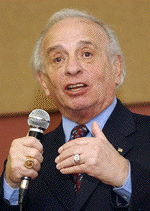|
Holocaust survivor shares his story
By Micah
Sturr
Boomerang Staff Writer
Respect, not
love, is the key to peace. Holocaust survivor Jack
Adler shared his story and message about respect
with a standing-room-only audience at the
University of Wyoming College of Agriculture
Auditorium on Wednesday.
 "We
live in the greatest nation in the world,
represented by every race, ethnicity and religious
group, and it's a diversity that we should be very
proud of. It's a diversity that built and continues
to build this great nation of ours. However we also
have in our society hate groups who are ready and
willing to tear this great nation apart," Adler
said. "We
live in the greatest nation in the world,
represented by every race, ethnicity and religious
group, and it's a diversity that we should be very
proud of. It's a diversity that built and continues
to build this great nation of ours. However we also
have in our society hate groups who are ready and
willing to tear this great nation apart," Adler
said.
Adler used
his survival story as a backdrop to illustrate some
of the historical causes of anti-Semitism, the
historic and future impact that hate had and can
have and to demonstrate that common, decent people
can be part of a system of hate and
discrimination.
"Many people
came to the United States hoping to find freedom
and opportunity, but they came from countries where
anti-Semitism was a way of life and they brought
with them this little baggage of hatred and they
passed it along to future generations," Adler
said.
The latent
anti-Semitism in America prevented the United
States from bombing the crematorium or railroad at
Auschwitz, Adler said
"If they
would have bombed just the railroad tracks, over 1
million innocent lives would have been saved. As
you can see, there is enough blame to go around,"
Adler said.
Five Jewish
lives lost in the holocaust belonged to Adler's
immediate family. His two young sisters were killed
at Auschwitz, his brother and mother died in the
Lodz ghetto in Poland and his father in Dachau.
Only Adler survived. He moved to America as a war
orphan at the age of 16 after being liberated by
American soldiers in 1945.
In 1939 Nazi
soldiers occupied Adler's hometown of Pabianice,
Poland. Jewish residents immediately were forced
into a ghetto and systematically abused. Adler's
family was separated on a soccer field along with
the rest of the community's Jews. The old, sick and
young were sent to death camps and those capable of
slave labor to worked in and concentration
camps.
This pattern
would continue, as the starving and broken were
separated from the starving and whole until only
Adler remained of his family. Despite the suffering
and horrors that he was subjected to and saw, Adler
insisted the Germans are no different than other
groups of people and said some Nazi's acted
humanely when given the opportunity.
An SS colonel
left food in the ashes of his wood burning stove
for Adler to find when he cleaned the officer's
office every morning.
"He was a
decent human being who got caught up in something
over his head. When he had the chance to do
something humane he did," Adler said of the SS
cololonel he credited with saving his
life.
Despite the
recollections of tiny acts of humanity punctuating
intense suffering and cruelty, as well as
incontrovertible evidence supporting the facts of
the Holocaust, there are still
disbelivers.
"From the
Nazi trials and documents, to liberators who
testify to what they found when they liberated the
camps and eyewitnesses such as myself. Despite this
overwhelming evidence there are people in the world
today including the United States who deny the
holocaust," Adler said.
In addition
to hate groups like the Ku Klux Klan, Aryan Nation,
skin heads and the Nation of Islam, movie star and
director Mel Gibson is amongst anti-Semetic
holocaust deniers, Adler said.
"He chose,
deliberately, the Passion of the Christ because he
has the passion to re-ignite the origin of
anti-Semitism, or else he would have made a movie
about the teachings of Jesus -- love thy neighbor,
respect, thou shall not kill," Adler
said.
Blaming Jews
as a group for the death of Jesus is the seed of
anti-Semitism, and Gibson's film was designed to
nurture that lie and ancient hatreds, Adler
said.
"If it
weren't for organized religion, you wouldn't have
the holocaust. Religion is the most divisive force
ever created by mankind," Adler said.
Divisions
created by hate are not possible when there is
mutual respect, Adler said. All people are of one
race -- the human race -- and basic respect for the
humanity in everyone is necessary to snuff out
hate, Adler said.
"I don't love
or like everyone, however in order for us to
survive as a nation, we must learn to respect each
other. Don't love me, don't like me, just respect
me as a human being," Adler said.
©
Laramie Boomerang
http://www.laramieboomerang.com/news/more.asp?StoryID=102946
|